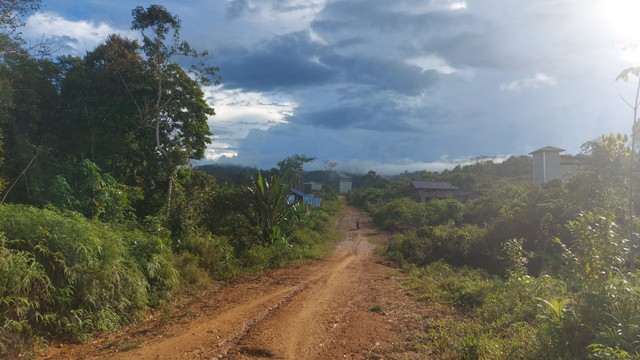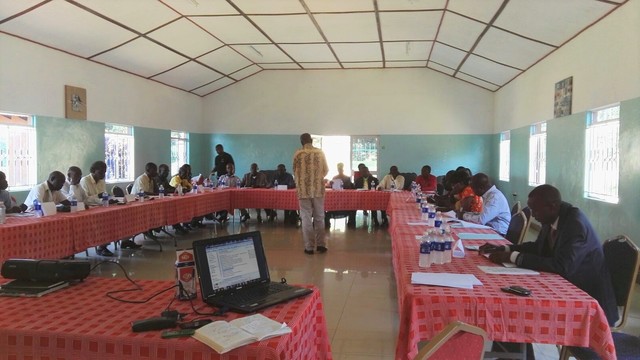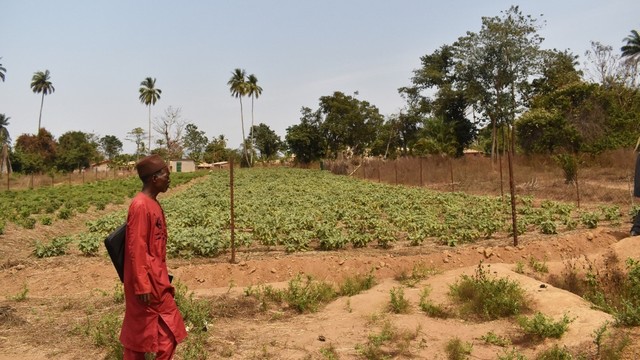Using legal tools to make agribusiness investments more accountable
A range of tools and approaches can support rural communities to exercise their rights and give them greater control over agribusiness deals that could affect their future, as a recent IIED webinar explored.


Agriculture is crucial to Senegal's economy, employing more than 60% of the population (Photo: Jelle Goossens/vredeseilanden, Creative Commons via Flickr)
The recent rise in agribusiness investments is driving up pressures on land and bringing the rights of rural communities under serious threat. A recent IIED webinar examined approaches in Cameroon, Ghana and Senegal that are helping rural communities protect their rights and challenge investments that affect their livelihoods.
Why we need more accountability in agribusiness investments
Governance around these investments, especially in low- and medium-income countries where the biggest surge in deals is taking place, is opaque and lacks accountability. As a result, local communities can be restricted from accessing their land while conflicts within communities and between communities, investors and the state escalate.
Many rural people are not aware of their rights or how to use the law, leaving them unequipped to deal with those challenges.
Between 2014 and 2017, a project called 'Pathways to accountability in the global land rush: lessons from West Africa' worked in Cameroon, Ghana, and Senegal to help rural communities understand how to harness the law to give them greater control over the decisions made during agribusiness deals – a process called 'legal empowerment'.
Initiatives in Cameroon, Ghana, and Senegal
Cameroon, Ghana, and Senegal are all affected by the growing pressure on land. The project worked differently in each of the countries to improve the accountability of public authorities responsible for managing land and approving investments.
An initiative in Senegal, described by Mamadou Fall from Innovation Environnement Développement en Afrique (IED Afrique), piloted locally negotiated land charters in two locations and sets the ground rules on how local governments should perform their responsibilities vis-à-vis local communities, promote public participation in the decision-making process, and report to their constituents on terms agreed with investors. Community paralegals helped facilitate dialogue among the various stakeholders.
Watch a video recording from the presentation and panel session above or on IIED's YouTube channel
Mark Kakraba-Ampeh, from the Land Resource Management Centre (LRMC), discussed how consultative committees in Ghana represented diverse local groups (including migrants and youth) to promote inclusive decision making around agribusiness deals.
They also provided the committees with valuable learning materials, including a guide on decision making and benefit sharing regarding agribusiness investments, and a checklist detailing the process to allocate land to investors.
Samuel Nguiffo, from the Centre for Environment and Development (CED), talked about a project in Cameroon that selected and trained new law graduates ('junior lawyers') and seconded them to a local grassroots organisation where they assisted rural people in legal matters.
Key country wins
In Senegal the project team helped communities draw up land charters in two sites, with the local government expected to approve the final versions. Thanks to these charters, communities are now ready to take part in the land governance process and local governments and investors need to pay more attention to local communities' voices.
In Ghana, communities renegotiated the terms of an agreement they had previously entered into with an investor in one of the project areas, achieving better terms for local people, while another community was able to negotiate a community development agreement with an investor.
And in Cameroon, a new generation of junior lawyers is emerging, armed with crucial skills such as how to use the law to solve the practical problems of rural communities.
Branching out and scaling up
The Senegal project team is part of a national platform of civil society organisations. This makes it easier to share lessons with others who can adapt to other locations and influence the country's land reform process.
In Ghana, the project team shared lessons with other communities, state land agencies, and policymakers as well as customary land secretariats, and involved the media to raise awareness about the tools that have been developed.
In Cameroon, the project team is encouraging university professors to include new topics such as rural law and land law within the curriculum and is looking into how certain taxes could fund the work of junior lawyers.
Bringing investors and decision makers into the process is also essential: some companies in Cameroon are already beginning to realise that they need to go beyond the country's weak environmental and land law requirements if they want to sell on to international markets. Companies applying tighter standards, to strengthen their position when selling abroad, could be an influential factor in the land governance reform process.
Legal empowerment initiatives can be a powerful tool in supporting rural communities exercise their rights and increase their control over the decision-making process around agribusiness investments. If properly documented and shared, they can also help influence land governance reform over the longer term. A report, produced by the project teams, summarises results, insights and lesson learned.
Thierry Berger (thierry.berger@iied.org) is a qualified solicitor and IIED associate focusing on law and sustainable development.
Further resources
- Improving accountability in agricultural investments: Reflections from legal empowerment initiatives in West Africa, Thierry Berger, Lorenzo Cotula, Adrian Di Giovanni, Mamadou Fall, Mark Kakraba-Ampeh, Samuel Nguiffo, Téodyl Nkuintchua, Eric Yeboah (2017), IIED Report
- Land investments, accountability and the law: Lessons from West Africa, Lorenzo Cotula, Giedre Jokubauskaite (2016), IIED Report
- Land investments, accountability and the law: lessons from Senegal, Mamadou Fall, Moustapha Ngaido (2016), IIED Report
- Land investments, accountability and the law: lessons from Cameroon, Pierre-Etienne Kenfack, Samuel Nguiffo, Téodyl Nkuintchua (2016), IIED Report
- Land investments, accountability and the law: Lessons from Ghana, Eric Yeboah, Mark Kakraba-Ampeh (2016), IIED Report
- Charte de gouvernance foncière, IED Afrique (2017)



